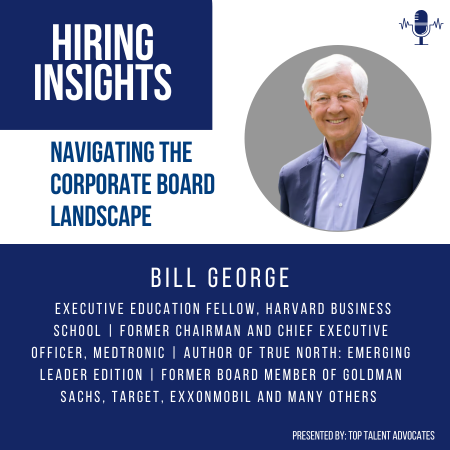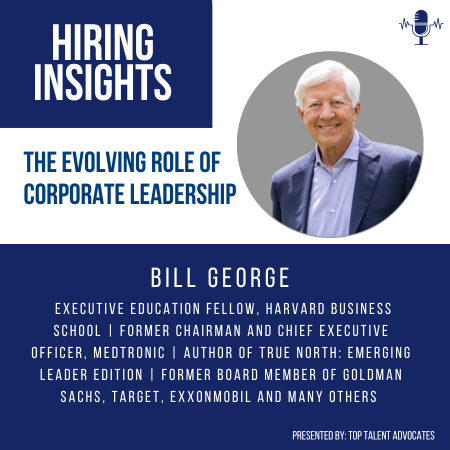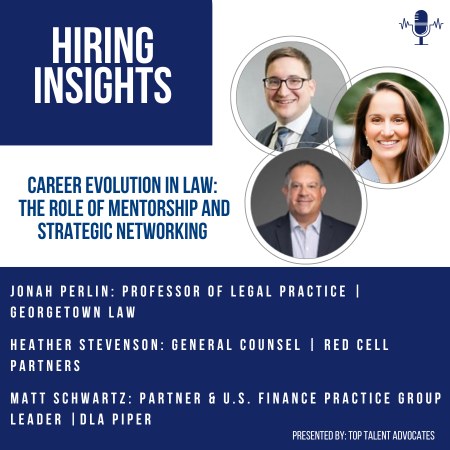Podcast Episodes
Bill George | Navigating the Corporate Board Landscape
Exploring the role of corporate boards and the mindset required to pursue board service intentionally and responsibly.
How to evaluate where your experience, perspective, and leadership can add meaningful value to an organization.
Understanding what board participation offers in terms of governance insight, strategic thinking, and personal leadership growth.
How to position yourself to be sought after: building relevant experience, cultivating credibility, and developing a network aligned with long-term board goals.
Why the first board seat is often the most challenging and strategies for overcoming that barrier.
Managing an executive-level career while maintaining the mindset, discipline, and adaptability required to be an impactful leader over time.
Listen Here
or click Read More for the transcript
Bill George | The Evolving Role of Corporate Leadership
Corporate executives face unprecedented pressure from external and internal expectations.
Employees today have higher expectations from their leadership than ever before.
Bad management leads to high turnover; people leave bad managers, not companies.
Promotion is based on performance and relationships, not just negotiation.
The hiring landscape values emotional intelligence alongside intelligence.
Compassionate leadership is becoming essential in modern management.
Listen Here
or click Read More for the transcript
Seth Spitzer | Strategic Shifts: Navigating Careers and the Evolving World of Legal Operations
Legal operations is a dynamic, multifaceted field driven by strategy, relationships, and scale.
Key growth areas shaping the future of legal operations.
Exploring diverse career paths that lead to legal ops, because there's no one-size-fits-all background.
Making a successful career transition through self-reflection and intention.
The role of work-life integration in sustaining a fulfilling career.
How mentorship and relationships fuel long-term success.
Listen Here
or click Read More for the transcript
Jonah Perlin, Heather Stevenson, Matt Schwartz | Career Evolution in Law: The Role of Mentorship and Strategic Networking
Nonlinear career paths can lead to success and career pivots can open unexpected opportunities.
Translating non-legal experience to law helps improve problem-solving, adaptability, and communication. Skills from business, teaching, and other fields enhance legal careers.
Leveraging social media for career growth can open doors. Posting insights, answering questions, and engaging online can lead to mentorship opportunities and unexpected career connections.
Listen Here
or click Read More for the transcript
Kevin Lewis | Hiring, Growth, and Board Expectations: Executive Insights
Career Navigation and Challenges: Decision-making pitfalls, such as prioritizing short-term gains over long-term growth opportunities.
Building and Leading Teams: Key qualities and attributes sought when building finance and accounting teams and identifying leadership qualities that align with organizational culture.
Strategic Board Engagement: Maintaining transparency by presenting clear updates, including wins and areas needing improvement.
Career Transition: The importance of leveraging personal networks to uncover opportunities.
Listen Here
or click Read More for the transcript
Michelle Comella | Redefining Success: Navigating Career Path Journeys
Networking can be intimidating and off-putting, tactics to open the conversation to job searches without making a direct job request.
How to explore opportunities that fulfill new personal and professional aspirations.
Leveraging third parties during the job search process can offer objective perspectives, help answer tough questions and provide alternative interpretations to avoid negative assumptions.
Strategies for explaining resume gaps, especially during interviews.
Listen Here
or click Read More for the transcript
Stewart Hirsch | Unlocking Your Potential: Referral Power, Networking Confidence, Leadership Skills, Career Advancement
Leadership is the art of managing people, but to truly be a great leader you have to inspire and influence others.
We all are referral sources for each other, whether you call it that is in question, but you do it all the time. Referral sources are resources.
Networking: we must have the mindset of both caring and curiosity about other people, it's a way of thinking.
Overcome fear or reluctance to network by taking the focus off of you. Focus on the other person. People like to talk about themselves.
Listen Here
or click Read More for the transcript
Lisa Lang | Connecting the Dots: Navigating Career Growth, Building Relationships, Harnessing Social Media
How do you develop a personal brand, a reputation and a persona outside of your organization?
If you're utilizing LinkedIn, it's not as much about the content you're posting, but the relationships that can be built from commenting and engaging with others.
When building relationships, give without expecting anything in return.
Career advancement isn't always a straight climb up in title and pay, consider lateral moves that will provide experience for the long-term strategy.
Listen Here
or click Read More for the transcript
Brian Davis | Advancing Careers: Insights for Outside Counsel From a Legal Recruiter
When do law firms choose to engage a search firm and what does that process look like?
Tools that candidates should be utilizing when either contemplating a search or in the middle of one.
If you're an associate or partner considering a move, what active steps should you be taking?
No one is worried about your career except for you, you have to manage it.
Expectations for an attorney's book of business and does that impact their ability to be recruited.
Listen Here
or click Read More for the transcript
Bryan Krajeski | Behind the Scenes With a Recruiter: Utilizing Your Career Tools, Networking, Searching for a Job
Specific steps a recruiter goes through to place someone; sourcing, building a talent pool, challenges.
Making outreach to a recruiter; when they can help, and when they can't.
Utilize the career tools at your disposal (LinkedIn, resumes, cover letters) but
put thought and strategy into how you are creating them.
Network. Network. Network. Talk to the recruiters who make outreach, look to
people in your industry, and strategize what companies you are targeting.
What qualities make a most placeable candidate (MPC)?
Finding a new position is a marathon not a sprint.
Listen Here
or click Read More for the transcript
Tom O'Connor, George Zaharatos, Lem Montgomery | Insights for Job Seekers and Hiring Managers
What you need as a job seeker in today's market to get hired.
As an attorney looking for a senior level role, whether that's at a firm or going
in-house, what should you know starting your search?
Social media plays a role in the hiring process, but how much?
The best c-suite leaders have these common traits...
What NOT to say in an interview.
Listen Here
or click Read More for the transcript
Tom O'Connor, George Zaharatos, Lem Montgomery | Navigating an Executive Career Path
Navigating your career path; is it intentional, linear, or opportunistic?
Regardless of your age or the stage of your career, having a mentor in your life is crucial to success.
Building a network without it feeling transactional.
Overcoming the fear of potential rejection when networking.
Listen Here
or click Read More for the transcript
David Hecker, Brenda Morris, Drew Fossum | Insights Into the Job Seeking Process and Experience
The legal and executive job market today; recession, record revenue, who's hiring right now?
There could be 10 other resumes just as good as yours, whether you're a CFO looking to make a move or an attorney with 20 years of experience, what should you be doing to stand out in the job search process?
Considerations before starting a search; be realistic about the possibilities for your career or the type of practice you are looking for, and the type of lifestyle you want to live.
Listen Here
or click Read More for the transcript
David Hecker, Brenda Morris, Drew Fossum | Navigating Your Legal Career Path
Career journeys: they're never linear.
You can't always control the options that you'll have at various points in your career, but they're critical junctures.
Taking on new opportunities, constantly absorbing knowledge, finding value in mentors and consistently networking, all play major parts in leading you down the most opportune path.
Building and cultivating a professional network.
Going in-house as an executive is a dual functioning role, what should you be aware of to bring value across cross-functional teams?
Listen Here
or click Read More for the transcript
Jenny Wood | Navigating a Career Path, Creating Followership as a Leader, and How to Showcase Your Full Potential
Be bold, be curious, be you. Utilize your curiosity either as a leader or as someone aspiring to be a leader, it's okay to not have all of the answers.
Lateral moves are some of the most powerful moves you can make. Look for the potential and the opportunities it could create for you.
Bullets on your resume. Don't be vague or generic. There are three things that you must have: numbers, context, and action.
It isn't about the five-year or ten-plan, it's about the big, small things that you can do day to day that add up to the long-term plan.
Listen Here
or click Read More for the transcript
Brian Potts | Changing the Landscape for Law Students and How to Translate Rejection in a Job Search into Motivation
When searching for your first job or even later in life, stop and strategically think about where are you the most marketable? Can you be flexible geographically to get a steppingstone to your dream job?
70-85% of all jobs come from someone you know. You HAVE to network.
It's rare that anyone regrets going to law school, but the system is failing to adequately prepare law students for the job search, among other things.
Advice for those headed to law school or even considering a career in the legal field.
Listen Here
or click Read More for the transcript
Ricardo Watson | Managing Your Career: Pursuing and Capitalizing On Opportunities
What are executives searching for when building their teams? What are the qualities that can’t be quantified?
You have to be intentional and focused when pursuing a career. Start with a clear understanding of your list of must have and have-nots.
Global experience in corporate America.
One of the most overlooked parts of the interview process are the questions you will ask at the end. Utilize this time to assess the culture and dynamics of the leadership and organization.
Listen Here
or click Read More for the transcript
Kristi Stepp: A 360 Degree Look at Career Strategy: Executive Search, Onboarding, Retention, and Succession Planning
Talent Acquisition: searches, internal candidates, succession planning.
Exploring the complexities of a search.
A shift in the landscape of recruiting and career searches.
Who are your super connectors and how can they help you in your career search?
If you are looking for an executive role, most of them will not be posted on LinkedIn or other job boards. How do you find them?
Listen Here
or click Read More for the transcript


















